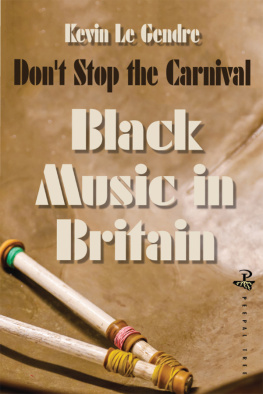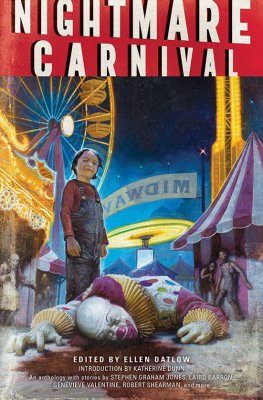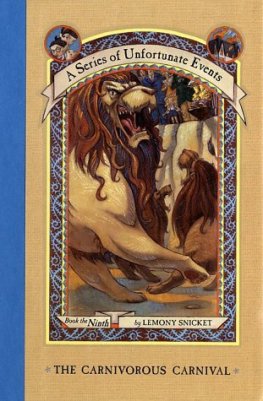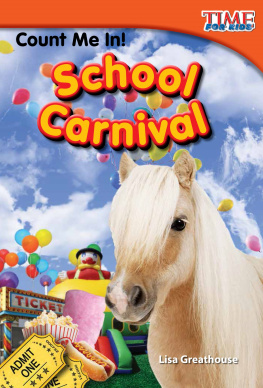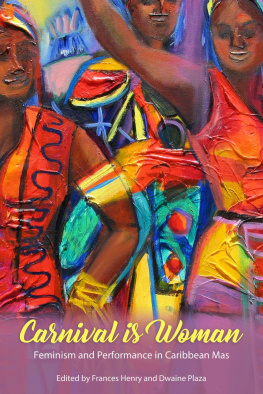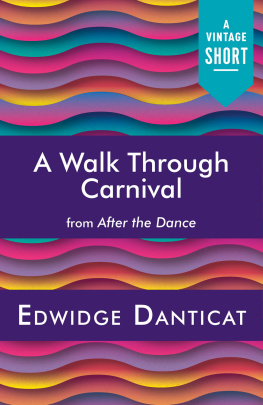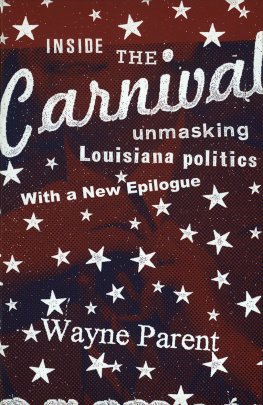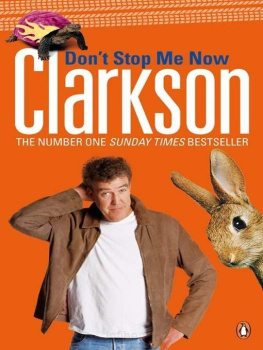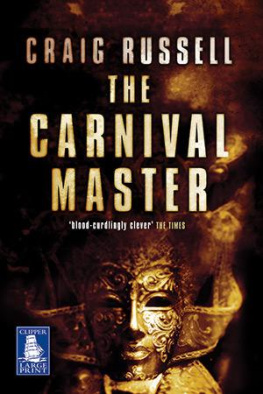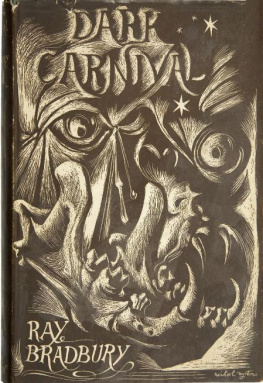Le Gendre - Dont Stop the Carnival
Here you can read online Le Gendre - Dont Stop the Carnival full text of the book (entire story) in english for free. Download pdf and epub, get meaning, cover and reviews about this ebook. City: Great Britain;Großbritannien, year: 2018, publisher: Book Network Intl Limited trading as NBN International (NBNi), genre: Detective and thriller. Description of the work, (preface) as well as reviews are available. Best literature library LitArk.com created for fans of good reading and offers a wide selection of genres:
Romance novel
Science fiction
Adventure
Detective
Science
History
Home and family
Prose
Art
Politics
Computer
Non-fiction
Religion
Business
Children
Humor
Choose a favorite category and find really read worthwhile books. Enjoy immersion in the world of imagination, feel the emotions of the characters or learn something new for yourself, make an fascinating discovery.
- Book:Dont Stop the Carnival
- Author:
- Publisher:Book Network Intl Limited trading as NBN International (NBNi)
- Genre:
- Year:2018
- City:Great Britain;Großbritannien
- Rating:5 / 5
- Favourites:Add to favourites
- Your mark:
- 100
- 1
- 2
- 3
- 4
- 5
Dont Stop the Carnival: summary, description and annotation
We offer to read an annotation, description, summary or preface (depends on what the author of the book "Dont Stop the Carnival" wrote himself). If you haven't found the necessary information about the book — write in the comments, we will try to find it.
Dont Stop the Carnival — read online for free the complete book (whole text) full work
Below is the text of the book, divided by pages. System saving the place of the last page read, allows you to conveniently read the book "Dont Stop the Carnival" online for free, without having to search again every time where you left off. Put a bookmark, and you can go to the page where you finished reading at any time.
Font size:
Interval:
Bookmark:
DONT STOP THE CARNIVAL
KEVIN LE GENDRE
DONT STOP THE CARNIVAL
BLACK MUSIC IN BRITAIN
VOLUME 1

https://www.peepaltreepress.com/home
https://www.facebook.com/peepaltreepress
https://twitter.com/peepaltreepress
First published in Great Britain in 2018
Peepal Tree Press Ltd
17 Kings Avenue
Leeds LS6 1QS
UK
Kevin Le Gendre, 2018
All rights reserved
No part of this publication may be
reproduced or transmitted in any form
without permission
ISBN13 Print: 9781845233617
ISBN13 Epub: 9781845234454
ISBN13 Mobi: 9781845234461

INTRODUCTION
BLACK BRITAIN, IN SOUND, SIGHT AND DEED.
In early 2018, the UK national press carried the story of the facial reconstruction of one of the earliest known inhabitants of Britain. DNA analysis carried out by researchers from the Natural History Museum of a skeleton that dated back at least 10,000 years produced results that unceremoniously overturned long-held assumptions about the ancestry of the nation. Or at least what it looked like.
Cheddar Man was black. Whether this was a quirk of evolution or a reminder that modern science needs to look as far back as it does forward, the discovery raised no end of debate. If the first Briton was actually not white, then what does that say about successive generations down to today? Is there a spook haunting the family house rather than just sitting by the door?
National identity remains a concern in societies all over the world, and Britain is no different, especially when some politicians and media are wilfully advancing the notion of a distinct, unexpurgated British Britain, a Britain first or, as Eurosceptics trumpet, a Britain that craves and deserves its independence. Freedom from the fair-skinned technocrats of Europe as well as from the onslaught of dark-skinned migrants from Africa, or even, in the 70th anniversary of the arrival of Empire Windrush, a hunt to find and expel elderly West Indians who have lived and worked in the UK for fifty years, but dont have the requisite papers.
The existence of an ancestor, or an indigenous inhabitant with roots running so deep that it turns racially polarized stereotypes on their heads, cannot but strengthen the case for asking who exactly we are, and from where we might have come. UCL geneticist Mark Thomas was forthright on the value of Cheddar Man in the context of education and cultural awareness. If it becomes a part of our understanding then I think that would be a much better thing. I think it would be good if people lodge it in their heads, and it becomes a little part of their knowledge.
This should force us to ask: how much do we really know about the peoples of Britain and their journey through the ages? Cast against the emblematic backdrop of the Union Jack, the flag that was flown proudly around the world to denote the expansion of England beyond its original borders, the perception of our population as mono-racial, a comforting we before a discomfiting they, has long looked absurd.
In keeping with the way historians and scientists continue to bring vital new information to light on the real complexity of the past, Dont Stop The Carnival is based on the premise that tracing the lives that black people in, and of, Britain may have led, and the forms of cultural expression they devised, can make a contribution to our understanding of the past as not just multi-faceted, but decisive in its contribution to the present. As a pervasive, dynamic, and often exhilarating artform, music has always been an outlet for the imagination of people of vastly differing circumstance, whether from a privileged elite or from a disenfranchised working class. The goal of this book is to put under the spotlight as large a cross-section as possible of the music makers in British history who have been classified according to a range of terms: Negro, coloured, African, Ethiopian, Black American, West Indian, Caribbean. Of course, the geographical range of musics that have arrived in Britain and taken root here is wider than this. However, because the cut-off point in time for this first volume, of what is intended as a two-part study, is the mid-1960s, it does not deal with the emergence of music whose origins were the South Asian continent, the home-grown phenomenon of bhangra, for instance, in the 1980s.
All of the various epithets noted above reflect the whimsical lexicological shifts through time with regard to the naming and position in society of those who are perceived as the racial other. To this day, the chess-playing with words continues. BAME Black And Minority Ethnic is an official designation of communities in Britain who to all intents and purposes, trace their roots elsewhere and stand connected to another part of the world, which for the most part, means areas of the globe formerly known as the colonies or overseas territories, or even the dark continent, lands that were once part of a UK plc, constructed on conquest and lucrative dominion.
If the assets of the Caribbean islands and African states included such valuable commodities as sugar, cotton, cocoa and tropical fruits, and oil and minerals, then the export of their human resources has been equally important in the enrichment of the British national heritage. These were people who came to take up arms and fight wars for the mother country, who served for instance in the NHS, the transport system, on ships, in factories, and the subject of this book in the entertainment and cultural industries. These people brought with them sound as well as word and deed, and my focus is on the immense range of creative output and its roots in the quotidian experiences of these arrivants and settlers, who were recipients, variously, of adulation and disdain, lightning rods for complex, and often contradictory feelings about what actually constituted entertainment, art, culture, decorum, the emotionally and sexually exciting and the socially acceptable. Music played by Blacks asked questions about what it meant to be a human being, to exist in the world, to stand alongside others, to broach questions of freedom, family, friendship and fidelity, to have trouble in mind as well as joy in ones heart. There is a deep repository of stories about black musicians in Britain over time, from the minstrels and trumpeters of Tudor times, the street entertainers of the eighteenth and nineteenth centuries, the skilful practitioners of western classical music, the exponents of gospel and blues, the forerunners and innovators of what became marketed as jazz, and the pioneers of calypso, ska and high life. Then there are the champions of the idioms built on those ground-breaking foundations: rhythm & blues, soul, rock and rocksteady. The constant is change. The sound moves on. The instruments with which the sound is made also evolve.
All this points to the fact that music made by Blacks in Britain has never been one thing, and we can only understand its artistic scope and social ramifications if we embrace its multiplicity. Part of the creative momentum underpinning musical development has always been its proximity to other forms, including dance, cinema, theatre, literature and even the visual arts. This constant interconnectedness and cross-fertilization makes the story of Black music in Britain all the more vital. What and how a musician plays, the gestures they adopt on stage and the language used all connect to this wider cultural milieu.
With voices came instruments drums, strings, wind instruments of brass and wood. But there were also devices that did not fit into any existing western musical conventions. There were adaptations, if not adulterations, of percussion instruments, the use of sundry objects assembled for the purpose of rhythm that were initially subjected to the long arm of censure before enjoying the embrace of approval. The development of a music of passion, even of an explosive violence of sound, was part of a spirit of invention the ability to see something mundane as a blueprint for something ingenious the genius to make music from what, according to the norms of the day, was condemned as anti-musical. For defenders of received ideas about British or European culture, the music of the non-west was often perceived as noise.
Next pageFont size:
Interval:
Bookmark:
Similar books «Dont Stop the Carnival»
Look at similar books to Dont Stop the Carnival. We have selected literature similar in name and meaning in the hope of providing readers with more options to find new, interesting, not yet read works.
Discussion, reviews of the book Dont Stop the Carnival and just readers' own opinions. Leave your comments, write what you think about the work, its meaning or the main characters. Specify what exactly you liked and what you didn't like, and why you think so.

